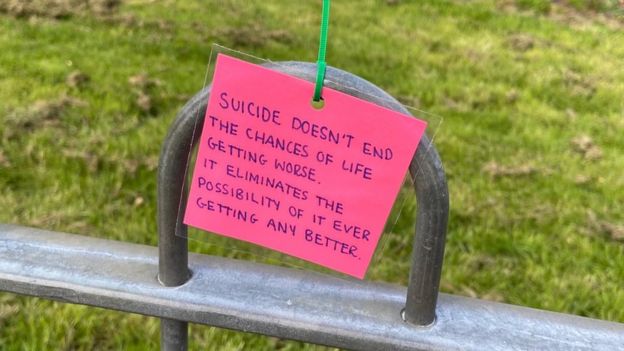 James Donaldson notes: I am turning more and more of my time and efforts towards mental health issues, especially pertaining to our young people and student-athletes.
James Donaldson notes: I am turning more and more of my time and efforts towards mental health issues, especially pertaining to our young people and student-athletes.
Getting men to speak up and reach out for help and assistance is one of my passions. Us men need to not suffer in silence or drown our sorrows in alcohol, hang out at bars and strip joints, or get involved with drug use.
Having gone through a recent bout of depression and suicidal thoughts myself, I realize now, that I can make a huge difference in the lives of so many by sharing my story, and by sharing various resources I come across as I work in this space. http://bit.ly/JamesMentalHealthArticle
Most of us are connected to someone who has died by suicide. Odds are, you know a lot more people who are thinking about it.
Of Americans 18 and older, 4 percent have had suicidal thoughts, according to the National Institute of Mental Health.
That figure is more than double for young adults: Nearly 9 percent of people 18 to 25 years old have thought about suicide. Not everyone who thinks about ending their life will attempt it, but the best way to make sure at-risk folks are getting the help they need is by talking about mental health issues with the people you love.
“As someone who last spring went through a very near suicide of a brother,… the biggest thing I learned from the whole experience is to do something. To speak up. To not worry so much about ‘what if I am fanning the flames of a suicidal ideation by talking about it,’” said Paul, a Minnesota-based actor who asked that his last name not be used in order to protect his brother’s privacy. “Nope. Every crisis counselor that I spoke with, and the person who answered the phone when I called the (National Suicide Prevention Lifeline), all said to speak up and not be afraid I would be causing harm by talking about it.”
Stigma around mental health makes it a difficult subject to bring up, but doing so can help you be an ally to the people who need it.
“Many people still fear ‘triggering’ or ‘worsening’ suicidal thoughts or attempts by discussing the issue,” said clinical psychologist Carla Manly. “In reality, talking about suicide openly and honestly can be very beneficial.”
However, best practices for the way to talk about suicide, and mental health in general, have changed over the years. Talking about suicide sensitively and mindfully is the most helpful way to end stigma and help people you love.
More than a diagnosis
For people who experience mental illness, or who have experienced a death by suicide in their circle, your words can have a massive impact—for better or for worse. With suicide being the 10th leading cause of death in the U.S., according to the American Foundation for Suicide Prevention, you could very well be interacting with someone whose life has been touched by it.
On top of being respectful, being conscious of your language around these topics will signal to the people close to you who are silently struggling with their mental health that you are a safe person to talk to.
“Person-first” language is a good place to start.
“A lot of people, some mental health professionals included, use diagnosis-first language, like saying someone is ‘a schizophrenic’ or ‘suicidal,’” said therapist Ashley C. Smith. “But, that language implies that is the only thing about that human being, whereas there is a lot more about them. They may have schizophrenia or suicidal thoughts, but they could also be a daughter, brother, mother, chef, etc.
“So, person-first language is the best way to talk about mental health issues, including suicide. (For example), I work with teens and adults with severe and persistent mental illness, not mentally ill teens and adults.”
Mental health professionals have also moved away from using the term “committed suicide,” which implies that the victim committed a crime by taking their own life.
“It’s hard for family and friends to hear that their loved ones have committed suicide, so it’s more sensitive to say someone died by suicide,” said therapist Katie Leikam.
Even the handbook most journalists follow, the Associated Press Stylebook, has updated its rules for writing about suicide.
“Avoid using ‘committed suicide’ except in direct quotations,” it reads. “Alternate phrases include ‘killed himself,’ ‘took her own life’ or ‘died by suicide.’ The verb ‘commit’ with suicide can imply a criminal act.”
It’s also respectful to avoid going into detail about the way a suicide death happened, “because it can trigger others, including loved ones of the person who died,” Leikam said.
How to bring it up
Changes in our culture have made it easier for people to support each other through mental health struggles, Smith said.
“In the past, discussions on suicidality were often ignored, marginalized, or avoided,” she said. “By taking a more pragmatic and transparent approach to suicidality, the avoidance and fear of addressing suicide have been lessened.”
Still, if you’re worried about a loved one and you’re not sure how to broach the subject, start by asking them, in an appropriate setting, simply how they’ve been doing lately.
“You can start asking about suicidal thoughts by saying something like, ‘It seems like you’ve been feeling…’ or ‘I’ve noticed that lately, you’ve been doing …’ and then expressing what you see that worries you,” therapist Aimee Daramus said. “Then you can say something like, ‘I’m worried that you might be thinking of harming yourself.’ Put it in your own words so the conversation feels more natural.”
It’s good to check in on everyone you care about once in a while, even if you don’t have reason to suspect they’re struggling.
“After recent high-profile suicides, there’s been an interesting statement revolving around social media: ‘Check on your strong friend,’” said Jake Kountz, a marriage and family therapist trainee, and mental health writer. “This statement means that regardless of how others around you present themselves—positive, optimistic, etc.—it’s still a good idea for clear communication to occur as suicide can happen to anyone. Even if that means asking the hard questions.”
This is part of a series of stories to bring awareness to the issue of suicide, in honor of National Suicide Prevention Month. If you or someone you know needs support, contact the 24-hour National Suicide Prevention Lifeline at 1-800-273-8255.
Katie Moritz is Rewire’s web editor and a Pisces who enjoys thrift stores, rock concerts and pho. She covered politics for a newspaper in Juneau, Alaska, before driving down to balmy Minnesota to help produce long-standing public affairs show “Almanac” at Twin Cities PBS. Now she works on this here website. Reach her via email at kmoritz@tpt.org. Follow her on Twitter @katecmoritz and on Instagram @yepilikeit.


